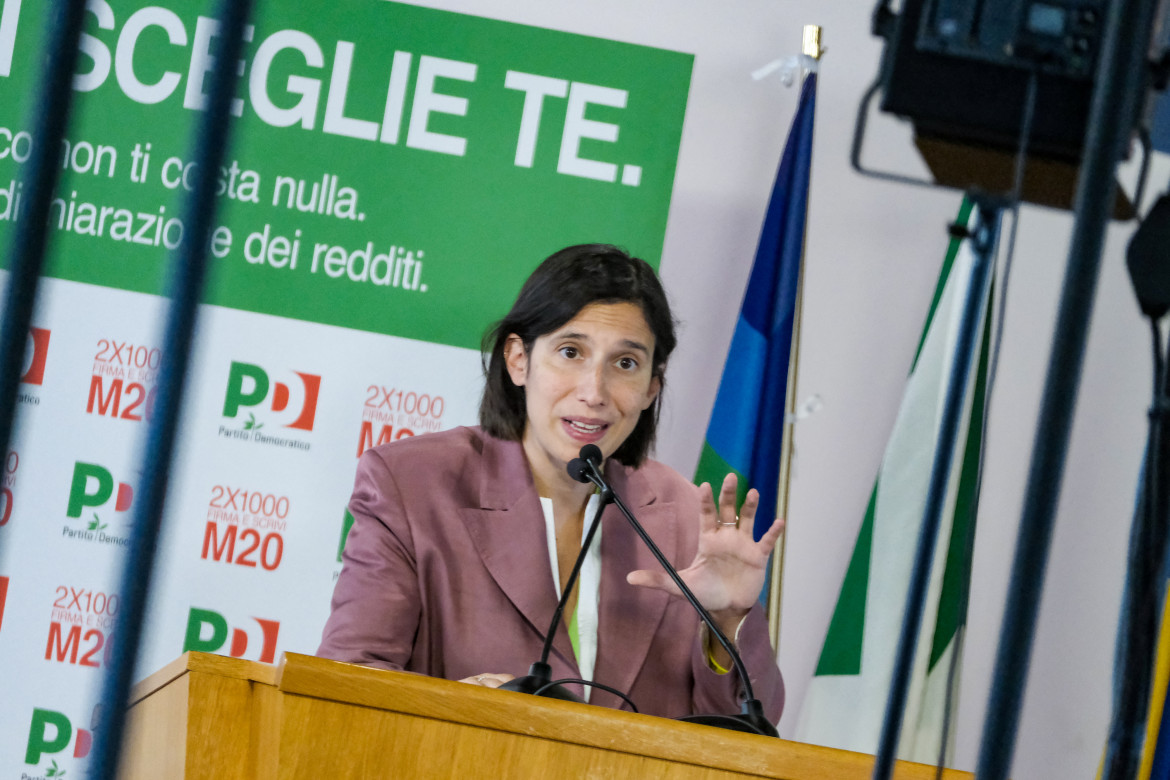Elly Schlein has just concluded the PD leadership meeting. With unanimous approval of her report, the mood on the third floor of the party’s headquarters in Via Nazareno was one of peace between the different impulses animating the Dems. They are all aware that, at least until the European elections, they must march together. The PD secretary answered il manifesto’s questions from the leadership table in the large meeting hall.
You have called for a street demonstration on November 11 against the government and for the protection of public healthcare. Do you think the phase of resignation and discouragement among center-left people is over?
The purpose of the left is precisely to transform resignation into mobilization, hope and a concrete proposal: that is our challenge. We have had a militant summer, focused on people’s concrete needs, from housing to health and the minimum wage, but also against differentiated autonomy, which aims to increase inequality in the country, especially at the expense of the South. I did sense an awareness of the need to move the country forward on these issues: during the summer we held 1,500 events and I saw a surprisingly high level of participation. One of the reasons I ran for office was that in September 2022, I sensed there was this lack of motivation and hope, even among our militants. Now it was them who asked us to return to mobilization with a big national demonstration, open to all people and social and political forces who feel the urgent impulse to give a signal that enough is enough.
Is that regarding the actions of the government?
This year, the governing right has shown its true colors: a year of ideological flags shoved in the faces of the poorest, and winking at tax evaders. And now they’re shocked that they have so few resources for the budget… And I won’t leave aside the brutal policies against migrants. I think people understand these things very well, because they’re experiencing them on their own backs every day. I’m also aware that it’s not easy to re-motivate people who no longer believe in politics. What’s most important to me is to rebuild a relationship, a relationship of trust with them in particular, although it’s not easy. There is a democratic crisis that is pushing out the poorer social strata.
Why are you calling for a protest before the budget draft has even been passed? Is it preemptive criticism?
Because we have already seen where they’re going with this. On the minimum wage, we’re being played for fools. They’re not going to give out the solutions the country needs; it’s going to be a budget full of perks for corporations. There’s no plan for development, least of all in the direction of ecological conversion, which is the basis of the NRP. It’s no accident that this government is wasting those funds.
You spoke of a street protest as the embryonic form of the alternative to the right-wingers. But aren’t you too late, with a progressive coalition still struggling to be born?
We feel this need to meet physically in a public square, as a community. It will be open to all who share these urgent impulses. We will continue to be stubbornly in unity with the other opposition forces, not to deny the differences that are there, but because we see common ground on which to join forces. On the minimum wage, we have been most effective by getting to a common proposal: we forced the government to look 3.5 million working poor in the face. On healthcare, we’re working on it.
On healthcare, despite the cuts the government has announced, you’re still struggling to find a common alternative proposal. Why is that?
The dialogue has started and will continue. I am confident that we’ll be able to come together on our proposals, starting with the need to increase the resources in the National Health Fund. Only those who have no idea what’s happening in the hospitals can say it’s not a problem of resources. The NADEF document confirmed the government’s intention to favor the privatization of healthcare: this is why it’s necessary for us in the opposition to join forces as soon as possible, to wage a common battle against the budget law.
If there’s a financial crisis and the government shows itself unable to steer the ship, what will the PD do? Is there a risk that you’ll sign up to a new technocratic government?
You’re asking someone who began her political journey by saying no to the “broad field” coalitions back in 2013. The PD will return to government only when it wins the next general election.
You’ve said that your protest will be focused on concrete proposals. So far, your leadership has been perceived as more against Meloni than for an alternative program.
There hasn’t been a single time that we criticized the government without adding one of our own proposals, built by listening to society. This is our choice of approach; it is our reformism. We will never be those who raise their voices against without having a proposal to put forward.
Give us some examples.
We are seeing the failure of right-wing demagoguery on immigration: they signed all the laws that have produced disasters and injustices, from Dublin to Bossi-Fini. We have presented 7 concrete proposals to manage the migratory phenomenon, focusing on European solidarity, legal ways to access and widespread reception in agreement with the mayors.
Your proposal is based on the idea that at some point, the European partners would decide to lend Italy a hand. So far, this has not been the case.
By its very nature, the left is fighting to change what is not right. If we wanted to resign ourselves to how things are, we’d have to get another job. When 4 million Ukrainians arrived in Poland, the Temporary Protection Directive was unblocked for the first time, so those fleeing war were allowed to reach all European countries legally. Why is this not being done for those coming from the Mediterranean as well? If the problem is their skin color, then that’s racism. I would add that they’re voting on a pact on migration in Brussels that is not a true and equitable sharing of reception, but a watered-down compromise. And this is because Meloni doesn’t have the courage to fight this battle, as she doesn’t want to upset her nationalist allies.
You’ve mentioned Ukraine. The government is also showing signs of fatigue in its military support for Kyiv, in the face of a war that shows no sign of ending. Doubts are also growing among those on the left. What is the PD doing, in the face of a Europe that won’t step up?
The role Europe is playing is not an immutable given. We want to change the things that are not right: we’re faced with challenges that no government can deal with alone. Either we’re able to manage these crises at the European level or we will fail. I’ve always denounced in strong terms the absence of a European diplomatic and political effort, which so far has been lacking. But I’m not resigned to this fact. I have been in the European Parliament for 5 years and have always opposed the idea of dull bureaucrats deciding over our heads. Sometimes it’s actually possible to break through the wall of conservatism, and national selfishness – as happened with Next Generation EU.
After seven months at the head of the PD, what’s the bottom line? Has the usual turning against the leader started yet?
Absolutely not. I see a party that has shown signs of great vitality and a great ability to mobilize, all ingredients that we’re bringing to the table to build a winning coalition. In my view, today’s leadership meeting confirmed that we are a healthy party, capable of uniting for fights we all share.

